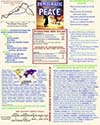[First published October 17, 2005] A study has just been published by the Human Security Center, War and Peace In The 21St Century (pdf here). I recommend reading it for the comprehensiveness of its data and analysis.
The reports conclusions are:
Over the past dozen years, the global security climate has changed in dramatic, positive, but largely unheralded ways. Civil wars, genocides and international crises have all declined sharply. International wars, now only a small minority of all conflicts, have been in steady decline for a much longer period, as have military coups and the average number of people killed per conflict per year. The wars that dominated the headlines of the 1990s were real—and brutal—enough. But the global media have largely ignored the 100-odd conflicts that have quietly ended since 1988. During this period, more wars stopped than started. The extent of the change in global security following the end of the Cold War has been remarkable:
°The number of armed conflicts around the world has declined by more than 40% since the early 1990s. [See the igure below from the report]
°Between 1991 (the high point for the post–World War II period) and 2004, 28 armed struggles for self-determination started or restarted, while 43 were contained or ended. There were just 25 armed secessionist conflicts under way in 2004, the lowest number since 1976.
°Notwithstanding the horrors of Rwanda, Srebrenica and elsewhere, the number of genocides and politicides plummeted by 80% between the 1988 high point and 2001.
°International crises, often harbingers of war, declined by more than 70% between 1981 and 2001.
°The dollar value of major international arms transfers fell by 33% between 1990 and 2003 (Figure 1.10). Global military expenditure and troop numbers declined sharply in the 1990s as well.
°The number of refugees dropped by some 45% between 1992 and 2003, as more and more wars came to an end.
°Five out of six regions in the developing world saw a net decrease in core human rights abuses between 1994 and 2003.
The positive changes noted above date from the end of the Cold War. Other changes can be traced back to the 1950s:
°The average number of battle-deaths per conflict per year—the best measure of the deadliness of warfare— has been falling dramatically but unevenly since the 1950s. In 1950, for example, the average armed conflict killed 38,000 people; in 2002 the figure was 600, a 98% decline.
°The period since the end of World War II is the longest interval of uninterrupted peace between the major powers in hundreds of years.
°The number of actual and attempted military coups has been declining for more than 40 years. In 1963 there were 25 coups and attempted coups around the world, the highest number in the post–World War II period. In 2004 there were only 10 coup attempts—a 60% decline. All of them failed.
How do they explain this great decrease in warfare and its severity?
A dramatic increase in the number of democracies. In 1946, there were 20 democracies in the world; in 2005, there were 88.10 Many scholars argue that this trend has reduced the likelihood of international war because democratic states almost never fight each other.
An increase in economic interdependence . Greater global economic interdependence has increased the costs of cross-border aggression while reducing its benefits.
A decline in the economic utility of war . The most effective path to prosperity in modern economies is through increasing productivity and international trade, not through seizing land and raw materials. In addition, the existence of an open global trading regime means it is nearly always cheaper to buy resources from overseas than to use force to acquire them.
Growth in international institutions . The greatly increased involvement by governments in international institutions can help reduce the incidence of conflict. Such institutions play an important direct role in building global norms that encourage the peaceful settlement of disputes. They can also benefit security indirectly by helping promote democratisation and interdependence.
There you have it. The first empirical anslysis to note the sharp decrease in violence other than my own, and to attribute it to the democractic peace. My only disagreement is that I would consider the democracies achieving a critical mass to be the major cause, and the others to be minor. The other causes existed before the decrease in violence, and it is only that growth in democracies that is the factor that significantly changed — that along with the end of the Cold War, which be it recalled, was predicted at the time to lead to a leap in violence, since the Soviet Union (having disappeared) and U.S. were no longer concerned to cap any violence that might draw them into a major war with each other.
Link of Day
“Final Report of the Commission on Human Security” A UN Report different from the above
The report proposes a new security framework that centers directly and specifically on people. Human security focuses on shielding people from critical and pervasive threats and empowering them to take charge of their lives. It demands creating genuine opportunities for people to live in safety and dignity and earn their livelihood.
RJR: Note this policy conclusion: “Clarifying the need for a global human identity while respecting the freedom of individuals to have diverse identities and affiliations.”
Links I Must Share
A controversial new work says French school textbooks are just plain anti-American.
RJR: Is there any doubt?
“Rice: No presidential ambitions”
RJR: This is politicospeech for, “I’ll run if people show enough interest.”
“TRUE ACADEMIC FREEDOM HAS A NEW ALLY”
The cultural left has a new tool for enforcing political conformity in schools of education. It is called dispositions theory, and it was set forth five years ago by the National Council for Accreditation of Teacher Education: Future teachers should be judged by their “knowledge, skills, and dispositions.”
RJR: By dispositions, or what in my academic experience was called “political sensitivety,” which was used to evaluate faculty and graduate student applicants, means bowing before the left’s holy icons. Five degrees is no good. It has to be a full forty-five degrees.
The chief of mission for Sudan in Washington, Ambassador Khidir Haroun Ahmed, assures the world in a Sept. 28 Op-Ed in The Washington Times that since “Every reliable report coming our of Darfur indicates that the situation has stabilized and the mortality rate has returned to pre-war levels,” at last there is “the beginning of a new era in Sudan.” Despite this exercise in public relations, the facts on the ground in Darfur are savagely different.
RJR: This is the UN, you know. It could not be otherwise.



 Posted by rudyrummel
Posted by rudyrummel 






